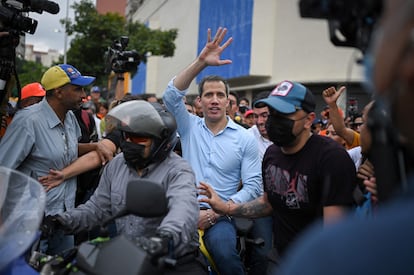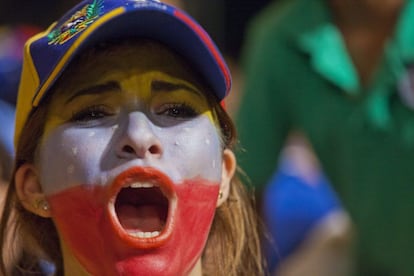Juan Guaidó more isolated than ever as US eases up on Maduro
Without the support of the other opposition parties and with Washington becoming increasingly distant, the days appear numbered for Venezuela’s interim government

One of the most extravagant experiments in the history of international diplomacy is about to come to an end. The alternative presidency of Venezuela, held by Juan Guaidó with the support of the United States, appears to have its days numbered. The main opposition parties in Venezuela do not want to continue participating in a parallel government that for the past three years has been attempting to isolate Nicolás Maduro and bring about his downfall. The idea was to paint the Caracas administration as illegitimate and the real one, with which the rest of countries should talk, as on the outside. The plan has not worked. Washington has even opened up new paths of dialog and negotiation with Chavism, by which it has de facto ceased to have faith in its own creation. This has left Guaidó, a young and little-known politician who was compared to Barack Obama when he took charge of this theoretical cabinet, more alone than ever.
The excitement Guaidó generated in those first few months has evaporated. He assumed the office of interim president of Venezuela when the National Assembly refused to recognize the inauguration of Maduro for a second term after dismissing the 2018 elections as fraudulent. Guaidó was recognized by numerous governments, including the United States and Canada, and his appointment was viewed as a way of displaying to the world that Chavism lacked legitimacy. The White House, then occupied by Donald Trump, and its allies underestimated Maduro’s capacity for resistance and the war in Ukraine, coupled with the leftist swing in Latin American politics, have given him an unexpected shot of oxygen. On the other hand, the interim government has been riven by internal disputes and criticism. Its obsolescence appears to be scheduled for January, when in theory Guaidó's government will be renewed and a replacement for the interim president sought.
But the opposition parties that make up the interim government – other than Guaidó's own – are instead thinking about dissolving it. The opposition assumed control of some Venezuelan public assets overseas after the interim government was set up in 2019, among them the petrochemical company Monómeros, the management of which has been plagued by corruption scandals despite Guaidó's attempts to restore order. It turned out to be a major failure and led to a loss of credibility among those who are seeking to dislodge Maduro from power. Issues such as this have cast doubt on the ability of such a divided opposition to bring about a transition to democracy in Venezuela.
The environment and circumstances that led to this diplomatic experiment have shifted radically. Joe Biden beat Trump in the 2020 presidential elections and although he has shown that he does not trust too much in Chavism, due to the energy crisis provoked by the Ukraine war he is exploring the possibility of Caracas supplying the US with gas and oil. US pragmatism has left Guaidó, who never thought his mentor would play both sides, adrift. Furthermore, newly elected Colombian President Gustavo Petro has a very different approach to Venezuela than his predecessor, Iván Duque, who was an enthusiastic participant in the creation of Guaidó's parallel government and who, in a moment of euphoria, suggested Maduro had only hours left in power.
There have also been internal defections. Recently, upon resigning from Popular Will (VP), the party founded by Leopoldo López and which Guaidó previously belonged to, Roberto Marrero, who held various key positions in the VP political structure, said that the opposition is discussing how to shut down the interim government without incurring overly onerous political costs. The Biden administration, while reiterating its commitment to Guaidó, has also had its differences when it comes to what it considers to be the proper functioning of an institution invented from scratch.
This besiegement has not led Guaidó to withdraw from the front line, or to renounce his status, as he travels up and down Venezuela questioning the legitimacy of Maduro and calling for clean and verifiable elections. His approval ratings in the polls have declined, but he retains a large base of support and holds a clear advantage over most of his competitors. A few days ago, the leader of the opposition staged a tour of Caracas to demand a date for elections, bringing together an acceptable number of supporters under his banner. Guaidó claims to be the legitimate president of Venezuela, but at the same time he wants to dispute the position he considers usurped by Maduro. This ambiguous stance has diluted his message. Chavism refers to his government as the “Kingdom of Narnia.”

“We are not going to gift Maduro international legitimacy”
“That date is not going to be a gift,” Guaidó told his followers. “No matter how much the dictatorship says with arrogance that it will call [elections] in 2024, or before. We know that this is a dictatorship, we know that nothing will be freely given. We have to take to the streets to fight for that date.” The main opposition parties have been meeting in Panama to start the process of primaries to elect a new leader, who will eventually take on Maduro when elections are called. The date slated for the primary elections is June 2023.
Sources close to the interim government acknowledge that, if he decides to stand as a candidate, Guaidó would formally resign to remain at the head of the interim presidency. What will not happen, says Yon Goicoechea from the Popular Will party, is that it will be dissolved and the National Assembly elected in 2015 relegated in its functions. “It makes no sense to violate the rules of the institution one defends. Without an interim presidency, national assets abroad are lost. We are not going to gift Maduro international legitimacy.”
Guaidó then is trapped between two loyalties. “It’s crazy to give legitimacy and recognition to Nicolás Maduro,” Goicoechea adds. “It has taken a lot of blood and sweat for the world to understand that he is a dictator. We are not going to whitewash him.” Whether he continues with the interim government or challenges Maduro for the presidency, it is inevitable Guaidó will leave disgruntled allies along the way.
The presidential elections are slated for 2024 and both Washington and Petro have called on Maduro to sit a Chavist delegation at the negotiating table in Mexico again to hammer out a deal between the ruling party and the opposition to agree on elections with genuine guarantees and in which the results will be respected. Diosdado Cabello, Vice President of Maduro’s United Socialist Party, has warned the elections could be brought forward and may even take place before the opposition primaries, in line with Chavism’s talent for disrupting the processes of its opponents.
Washington has granted Caracas important concessions in recent weeks – including the granting of new exploration licenses in Venezuela to Chevron and the liberation of two nephews of First Lady Cilia Flores, who were jailed in the US for drug-trafficking offenses – under the condition that Maduro’s party return to the negotiating table in Mexico. Everything points to this happening sooner rather than later, although nothing concrete has been agreed. What is certain, on the other hand, is that Guaidó's adventure is coming to an end. Overthrowing Maduro has not proven to be as easy as some people believed.
Tu suscripción se está usando en otro dispositivo
¿Quieres añadir otro usuario a tu suscripción?
Si continúas leyendo en este dispositivo, no se podrá leer en el otro.
FlechaTu suscripción se está usando en otro dispositivo y solo puedes acceder a EL PAÍS desde un dispositivo a la vez.
Si quieres compartir tu cuenta, cambia tu suscripción a la modalidad Premium, así podrás añadir otro usuario. Cada uno accederá con su propia cuenta de email, lo que os permitirá personalizar vuestra experiencia en EL PAÍS.
¿Tienes una suscripción de empresa? Accede aquí para contratar más cuentas.
En el caso de no saber quién está usando tu cuenta, te recomendamos cambiar tu contraseña aquí.
Si decides continuar compartiendo tu cuenta, este mensaje se mostrará en tu dispositivo y en el de la otra persona que está usando tu cuenta de forma indefinida, afectando a tu experiencia de lectura. Puedes consultar aquí los términos y condiciones de la suscripción digital.








































